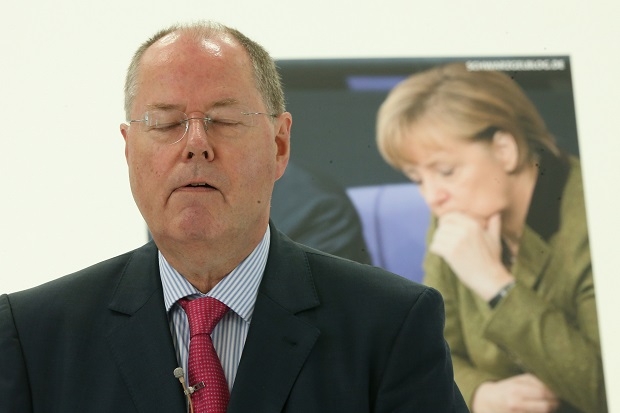As symbolism goes, it borders on cliché. Running out of time to gain any serious traction, Germany’s Social Democrats last week unveiled their new campaign posters, and they promptly disintegrated on first contact with rain. The seven images neatly chronicle – or will do once they’re replaced – the profound failure of the main challengers to Angela Merkel’s re-election to provide any serious challenge at all.
The first four have pictures of determinedly normal people standing alongside a totemic policy pledge: more childcare provision, lower rents, higher pensions, introduction of a minimum wage (Germany still doesn’t have one, though it has been a perennially topical debate). This is where the SPD really wanted to fight this campaign: leftish, social democratic policy suggestions aimed at people’s everyday concerns.
Hit-and-miss presentation and a good deal of in-fighting have partially obscured this message, but the biggest factor in its failure to penetrate has been the CDU’s longstanding tactic of so-called “asymmetric demobilisation”. In plain English, Merkel poaches just enough policies from her rivals – or hints at doing so – to arrest their momentum. When she gestured towards a minimum wage earlier this year, or more recently legal limits on rent rises, the SPD’s howls about coming late to the party were hardly the winning move they’d aimed for.
Polls repeatedly showed that many voters saw no significant difference between the two parties.
Running out of options, recent weeks have seen the SPD change tack, focussing on ad hominem scandal narratives. In a fiasco about drones, the German military only realised after sinking billions into the project that the “Euro Hawk” devices they had ordered could not take off from German runways. The controversy about who knew what and when still threatens the career of defence minister Thomas de Mazière. Then the Prism-NSA story broke, echoing longer and louder in Germany than in the UK. Memories of Stasi and Gestapo make the country less blasé when it comes to government surveillance.
There’s been no shortage of media coverage, and the government doesn’t come out of either story looking brilliant. “Merkel’s expert team?” asks poster number 5, showing the chancellor talking to the respective ministers at the centre of the scandals; poster 6 is a joke about her disregard for individual privacy. But voters see little relevance in the media storm for their own lives. They are essentially uninterested and the polls are unmoved.
Notably absent from the posters is Peer Steinbrück. This briefly plausible candidate for chancellor became a major electoral liability with breathtaking speed, mixing eyebrow-raising private earnings for a left-wing candidate with a slew of gaffes. In a presidential election, Merkel would lead Steinbrück by 2 to 1.
Even becoming minor partner in a grand coalition is in increasing doubt, as polls last weekend show the current CDU-FDP government may stay in power. Either way, the Social Democrats will have to look back on a campaign in which they were skillfully outmaneuvered.
There were missed opportunities. They might have been bolder in attacking Merkel earlier, as she is certainly the biggest factor in the CDU’s success, although this would have been problematic with such a weakened candidate of their own. They could have been more decisive in their positioning — rather than a vision of a new economic set-up rebalanced towards those on lower and middle-incomes, their policies are piecemeal tweaks to the status quo with a feel-good communitarian gloss.
Yet this campaign is not the challenger’s to win; it is the incumbent’s to lose. The premier nearly has 70% approval, leading a government with just over 50% approval. The seventh and final poster depicts Merkel, and forlornly asks: “Best government since reunification?” Unfortunately for the SPD, going off polls alone, it’s there or thereabouts. They have failed to offer a convincing alternative, and, even if they had, it may well have been shunned.






Comments